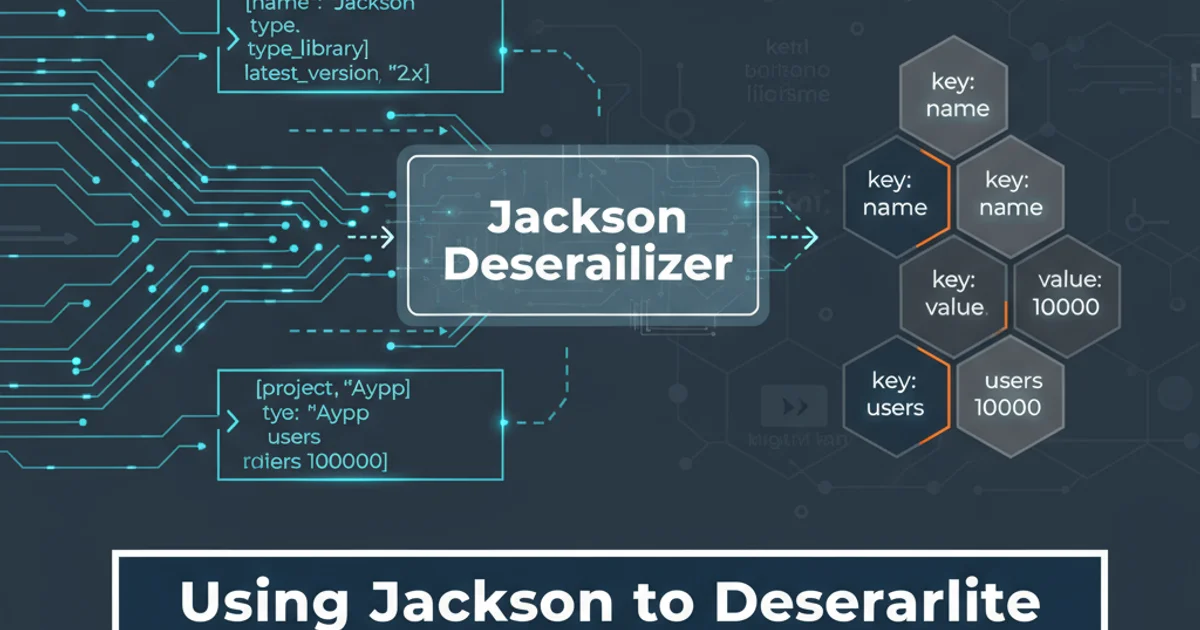Using Jackson to deserialize into a Map
Categories:
Mastering Jackson: Deserializing JSON into Java Maps

Learn how to effectively use the Jackson library to deserialize various JSON structures directly into Java Map objects, handling different key and value types.
Jackson is a powerful and widely used Java library for processing JSON data. While deserializing JSON into custom Java objects (POJOs) is common, there are scenarios where you might need to deserialize JSON directly into a java.util.Map. This approach offers flexibility, especially when dealing with dynamic JSON structures or when you don't have a predefined POJO for the entire JSON payload. This article will guide you through the different ways to achieve this, from simple string-to-string maps to more complex nested structures.
Basic Deserialization to Map<String, Object>
The most straightforward way to deserialize a JSON object into a Map is to use Map<String, Object>. Jackson will automatically parse the JSON keys as String and the values as their corresponding Java types (e.g., String, Integer, Boolean, List, Map). This is particularly useful when the exact structure of the JSON values is unknown or varies.
import com.fasterxml.jackson.databind.ObjectMapper;
import java.util.Map;
public class BasicMapDeserialization {
public static void main(String[] args) throws Exception {
String json = "{\"name\":\"John Doe\", \"age\":30, \"isStudent\":false, \"city\":\"New York\"}";
ObjectMapper objectMapper = new ObjectMapper();
Map<String, Object> result = objectMapper.readValue(json, Map.class);
System.out.println("Deserialized Map: " + result);
System.out.println("Name: " + result.get("name"));
System.out.println("Age: " + result.get("age"));
}
}
Deserializing a simple JSON object into a Map<String, Object>.
Map.class directly, Jackson defaults to Map<String, Object>. This is often sufficient for initial parsing, but you might need more specific types for nested structures or custom key types.Deserializing with Specific Key and Value Types
Sometimes, you know the specific types for your map's keys and values. For instance, you might have a JSON where keys are integers or values are always strings. Jackson's TypeReference allows you to specify generic types for deserialization, providing more type safety and control.
import com.fasterxml.jackson.core.type.TypeReference;
import com.fasterxml.jackson.databind.ObjectMapper;
import java.util.Map;
public class SpecificMapDeserialization {
public static void main(String[] args) throws Exception {
// Example 1: Map<String, String>
String json1 = "{\"firstName\":\"Jane\", \"lastName\":\"Doe\"}";
ObjectMapper objectMapper = new ObjectMapper();
Map<String, String> stringMap = objectMapper.readValue(json1, new TypeReference<Map<String, String>>() {});
System.out.println("String Map: " + stringMap);
// Example 2: Map<Integer, String> (JSON keys must be strings that can be parsed as integers)
String json2 = "{\"1\":\"Apple\", \"2\":\"Banana\"}";
Map<Integer, String> intKeyMap = objectMapper.readValue(json2, new TypeReference<Map<Integer, String>>() {});
System.out.println("Integer Key Map: " + intKeyMap);
}
}
Using TypeReference to deserialize into Map<String, String> and Map<Integer, String>.
flowchart TD
A[JSON String] --> B{"ObjectMapper.readValue()"}
B --> C{TypeReference specified?}
C -- Yes --> D[Use Generic Type Info]
C -- No --> E[Default to Map<String, Object>]
D --> F[Map Object (Specific Types)]
E --> F[Map Object (Generic Types)]
F --> G[Java Application]Jackson's Map Deserialization Flow
Handling Nested JSON Structures
JSON often contains nested objects and arrays. When deserializing into a Map, Jackson will represent nested JSON objects as nested Map<String, Object> instances and JSON arrays as List<Object> instances. This allows you to navigate complex structures dynamically.
import com.fasterxml.jackson.databind.ObjectMapper;
import java.util.List;
import java.util.Map;
public class NestedMapDeserialization {
public static void main(String[] args) throws Exception {
String json = "{\"user\":{\"id\":101,\"name\":\"Alice\"},\"roles\":[\"admin\",\"editor\"]}";
ObjectMapper objectMapper = new ObjectMapper();
Map<String, Object> data = objectMapper.readValue(json, Map.class);
System.out.println("Full Map: " + data);
// Accessing nested map
Map<String, Object> user = (Map<String, Object>) data.get("user");
System.out.println("User ID: " + user.get("id"));
System.out.println("User Name: " + user.get("name"));
// Accessing nested list
List<String> roles = (List<String>) data.get("roles");
System.out.println("Roles: " + roles);
}
}
Deserializing JSON with nested objects and arrays into a Map<String, Object>.
Map<String, Object>, always be mindful of potential ClassCastException if the actual JSON type doesn't match your expected Java type. Consider using instanceof checks or more robust type handling for production code.Customizing Deserialization with DeserializationFeature
Jackson provides various DeserializationFeature options to control how JSON is deserialized. For maps, features like ACCEPT_SINGLE_VALUE_AS_ARRAY or FAIL_ON_UNKNOWN_PROPERTIES can be particularly useful. You can enable or disable these features on your ObjectMapper instance.
import com.fasterxml.jackson.databind.DeserializationFeature;
import com.fasterxml.jackson.databind.ObjectMapper;
import java.util.Map;
public class CustomMapDeserialization {
public static void main(String[] args) throws Exception {
ObjectMapper objectMapper = new ObjectMapper();
// Example: FAIL_ON_UNKNOWN_PROPERTIES (default is true, but can be disabled)
String jsonWithUnknown = "{\"knownKey\":\"value\", \"unknownKey\":\"extra\"}";
try {
// This will throw an exception by default
// Map<String, Object> map = objectMapper.readValue(jsonWithUnknown, Map.class);
// System.out.println("Map with unknown (default behavior): " + map);
} catch (Exception e) {
System.out.println("Default behavior: " + e.getMessage());
}
// Disable FAIL_ON_UNKNOWN_PROPERTIES
objectMapper.configure(DeserializationFeature.FAIL_ON_UNKNOWN_PROPERTIES, false);
Map<String, Object> mapWithoutFail = objectMapper.readValue(jsonWithUnknown, Map.class);
System.out.println("Map with unknown (FAIL_ON_UNKNOWN_PROPERTIES disabled): " + mapWithoutFail);
}
}
Configuring DeserializationFeature for map deserialization.